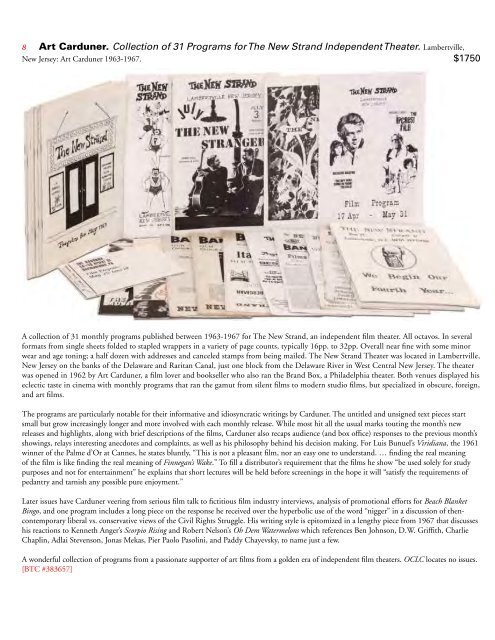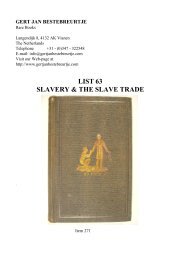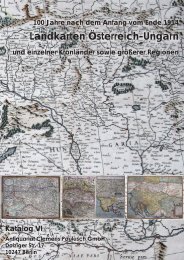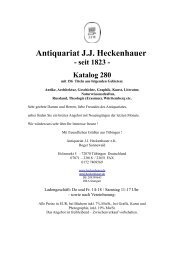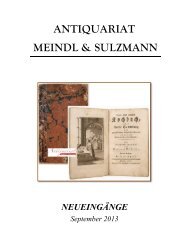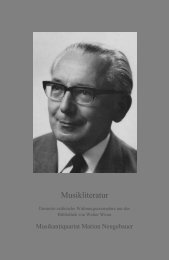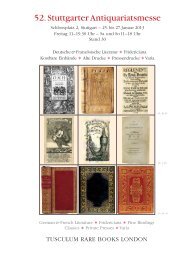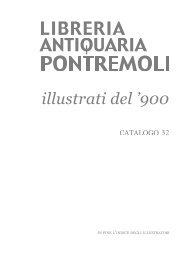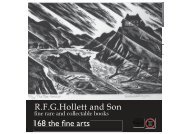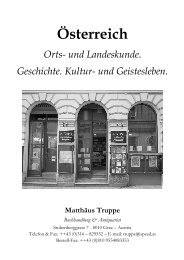Archives & Manuscripts #14 - International League of Antiquarian ...
Archives & Manuscripts #14 - International League of Antiquarian ...
Archives & Manuscripts #14 - International League of Antiquarian ...
Create successful ePaper yourself
Turn your PDF publications into a flip-book with our unique Google optimized e-Paper software.
8 Art Carduner. Collection <strong>of</strong> 31 Programs for The New Strand Independent Theater. Lambertville,<br />
New Jersey: Art Carduner 1963-1967. $1750<br />
A collection <strong>of</strong> 31 monthly programs published between 1963-1967 for The New Strand, an independent film theater. All octavos. In several<br />
formats from single sheets folded to stapled wrappers in a variety <strong>of</strong> page counts, typically 16pp. to 32pp. Overall near fine with some minor<br />
wear and age toning; a half dozen with addresses and canceled stamps from being mailed. The New Strand Theater was located in Lambertville,<br />
New Jersey on the banks <strong>of</strong> the Delaware and Raritan Canal, just one block from the Delaware River in West Central New Jersey. The theater<br />
was opened in 1962 by Art Carduner, a film lover and bookseller who also ran the Brand Box, a Philadelphia theater. Both venues displayed his<br />
eclectic taste in cinema with monthly programs that ran the gamut from silent films to modern studio films, but specialized in obscure, foreign,<br />
and art films.<br />
The programs are particularly notable for their informative and idiosyncratic writings by Carduner. The untitled and unsigned text pieces start<br />
small but grow increasingly longer and more involved with each monthly release. While most hit all the usual marks touting the month’s new<br />
releases and highlights, along with brief descriptions <strong>of</strong> the films, Carduner also recaps audience (and box <strong>of</strong>fice) responses to the previous month’s<br />
showings, relays interesting anecdotes and complaints, as well as his philosophy behind his decision making. For Luis Bunuel’s Viridiana, the 1961<br />
winner <strong>of</strong> the Palme d’Or at Cannes, he states bluntly, “This is not a pleasant film, nor an easy one to understand. … finding the real meaning<br />
<strong>of</strong> the film is like finding the real meaning <strong>of</strong> Finnegan’s Wake.” To fill a distributor’s requirement that the films he show “be used solely for study<br />
purposes and not for entertainment” he explains that short lectures will be held before screenings in the hope it will “satisfy the requirements <strong>of</strong><br />
pedantry and tarnish any possible pure enjoyment.”<br />
Later issues have Carduner veering from serious film talk to fictitious film industry interviews, analysis <strong>of</strong> promotional efforts for Beach Blanket<br />
Bingo, and one program includes a long piece on the response he received over the hyperbolic use <strong>of</strong> the word “nigger” in a discussion <strong>of</strong> thencontemporary<br />
liberal vs. conservative views <strong>of</strong> the Civil Rights Struggle. His writing style is epitomized in a lengthy piece from 1967 that discusses<br />
his reactions to Kenneth Anger’s Scorpio Rising and Robert Nelson’s Oh Dem Watermelons which references Ben Johnson, D.W. Griffith, Charlie<br />
Chaplin, Adlai Stevenson, Jonas Mekas, Pier Paolo Pasolini, and Paddy Chayevsky, to name just a few.<br />
A wonderful collection <strong>of</strong> programs from a passionate supporter <strong>of</strong> art films from a golden era <strong>of</strong> independent film theaters. OCLC locates no issues.<br />
[BTC #383657]


